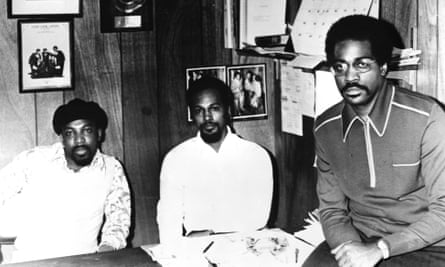Thom Bell, along with Kenny Gamble and Leon Huff, was part of the holy trinity of Philly soul – the lustrous, aspirational sound that bossed the US R&B charts between the peaks of Motown in the 60s and disco in the late 70s. Bell was a supremely confident, classically trained songwriter and arranger who introduced the celeste, the french horn and the harpsichord to soul music. The results were classicssuch as Didn’t I (Blow Your Mind This Time) for the Delfonics, Back Stabbers for the O’Jays and You Make Me Feel Brand New by the Stylistics.
He was born in Kingston, Jamaica, but his parents moved to Philadelphia when he was very young. His upbringing was solidly middle-class and he was playing piano from the age of four. By the time Bell was nine he could also play drums and flugelhorn. Rock’n’roll largely passed him by; instead, he idolised Burt Bacharach and the writer and arranger Teddy Randazzo. The local Cameo-Parkway label gave Bell his first employment as an arranger in 1965, and in no time his sound became instantly recognisable. “Nobody else is in my brain but me,” he told me. “Which is why some of the things I think about are crazy – I hear oboes and bassoons. An arranger told me: ‘Thom Bell, Black people don’t listen to that.’ I said: Why limit yourself to Black people? I make music for people. I wouldn’t care if they had a horn in their head.”
When Bell was recording the US No 1 single Then Came You in 1974, he told the Spinners’ Philippé Wynne to think of his singing partner Dionne Warwick as “a feather. I want you to sing so she floats around you and you float around her.” Johnny Mathis he regarded as a “gladiator”. In interviews he would invent his own language to make a point, using words like “enthusiated”. These marked him out as someone special – most songwriters and arrangers really don’t think this way. He also believed the only two subjects worth writing about were love and escape.
Philly group the Delfonics were the first to allow Bell to boss their sound, and the results were adventurous singles like La La Means I Love You, a Top Five US hit in 1968 that was so ahead of its time it didn’t chart in Britain for another four years and still sounded special. Bell began to work with the Stylistics and then, in 1972, the Spinners, creating even bigger hits. Throughout these years, Bell kept a very close-knit team around him. The lyricist he worked with the most was Linda Creed, who he always referred to simply as “Creed”. They worked together for nine years, creating classics such as the Stylistics’ You Are Everything and the Spinners’ I’ll Be Around. When Creed died of cancer in 1986 at the age of 37, Bell was at her side.
Bell remained financially savvy, steering clear of drink and drugs because, he told me, “I never wanted to embarrass my mother. Heck, no. My only hobby was tropical fish.” He also resisted tying himself down to one record label – much as his old Cameo-Parkway sidekicks Kenny Gamble and Leon Huff wanted him as their in-house arranger at Philadelphia International – which meant that when Columbia asked if he’d like to arrange the new album by the hugely successful crooner Johnny Mathis in 1975, he was free to jump in, fully committed.
The first thing Bell did was to interview Mathis, ask him about his life, and try to dig out what he really wanted from his new record. The result was the extraordinary, positivist single Life Is a Song Worth Singing: “No one had ever given him stuff like that before,” Bell said. “More mannish. I said: ‘Do you want to take that ride? Because don’t get to the middle of the stream and tell me you can’t swim.’ He was on pop radio and Black radio, he couldn’t believe it.” The companion album I’m Coming Home was Mathis’ best, and sold particularly well in the UK.
Bell’s approach with another huge star, Dionne Warwick, was more unorthodox yet. “Everything she did – she looked like a cat. She even sang through her nose like a cat,” reckoned Bell. So he wrote the slinky Track of the Cat for her; then, to add some atmosphere, he went to the nearest zoo at 6am and made a recording of a big cat. “And it was amazing, because he growled in the exact same key as she sang.”
Bell’s sound has remained remarkably fresh sounding. When Elton John’s Are You Ready for Love – an obscure product of 1977 sessions with Bell – was used on a Sky Sports advert in 2003, it became a No 1 single. Elton has since acknowledged that Bell’s records were the inspiration behind his timeless Philadelphia Freedom.
In his later years, Bell offloaded his 30-odd gold discs and 10 platinum discs to his kids and grandchildren. Good memories, but another lifetime to him. Besides, he needed the wall space for his 1,500 cookbooks – he had thrown himself into Asiatic cuisine with the same dedication and attention to detail that made him one of the most original writers and arrangers in all R&B.

